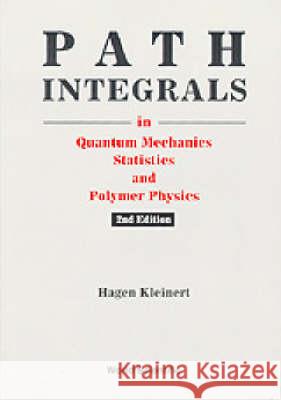Path Integrals In Quantum Mechanics, Statistics, And Polymer Physics (2nd Edition) » książka
Path Integrals In Quantum Mechanics, Statistics, And Polymer Physics (2nd Edition)
ISBN-13: 9789810214715 / Angielski / Twarda / 1995 / 920 str.
Path Integrals In Quantum Mechanics, Statistics, And Polymer Physics (2nd Edition)
ISBN-13: 9789810214715 / Angielski / Twarda / 1995 / 920 str.
(netto: 329,83 VAT: 5%)
Najniższa cena z 30 dni: 343,49
ok. 22 dni roboczych.
Darmowa dostawa!
This is the second, significantly expanded edition of the comprehensive textbook of 1990 on the theory and applications of path integrals. It is the first book to explicitly solve path integrals of a wide variety of nontrivial quantum-mechanical systems, in particular of the hydrogen atom. The solutions have been made possible by two major advances. The first is a new euclidean path integral formula which increases the restricted range of applicability of Feynman's famous formula to include singular 1/r- and 1/r2-potentials. The second is a simple quantum equivalence principle governing the transformation of euclidean path integrals to spaces with curvature and torsion.The powerful Feynman-Kleinert variational approach is explained and developed systematically into a variational perturbation expansion. In contrast to ordinary perturbation expansions, divergencies are absent. Instead, there is a uniform convergence from weak to strong couplings, opening a way to precise approximate evaluations of analytically unsolvable path integrals.Tunneling processes are treated in detail. The results are used to determine the lifetime of supercurrents, the stability of metastable thermodynamic phases, and the large-order behavior of perturbation expansions. A new variational treatment extends the range of validity of previous tunneling theories from large to small barriers. A corresponding extension of large-order perturbation theory now also applies to small orders.Special attention is devoted to path integrals with topological restrictions. These are relevant to the understanding of the statistical properties of elementary particles and the entanglement phenomena in polymer physics and biophysics. The Chern-Simons theory of particles with fractional statistics (anyons) is introduced and applied to explain the fractional quantum Hall effect.











